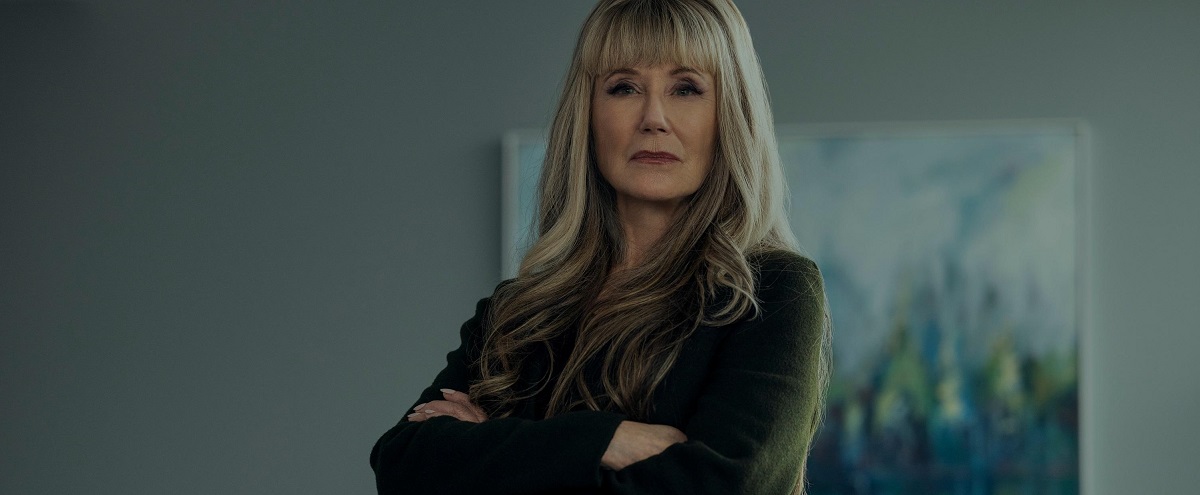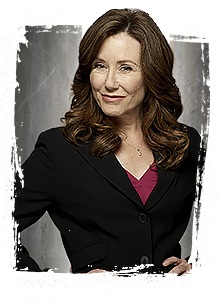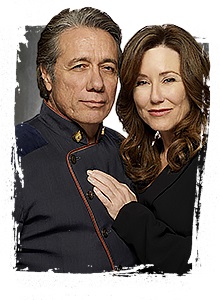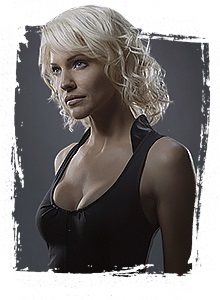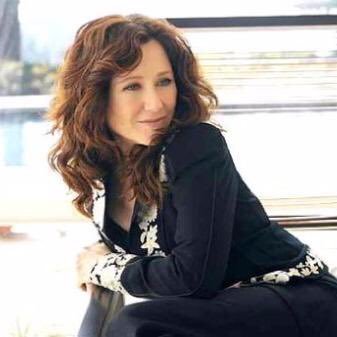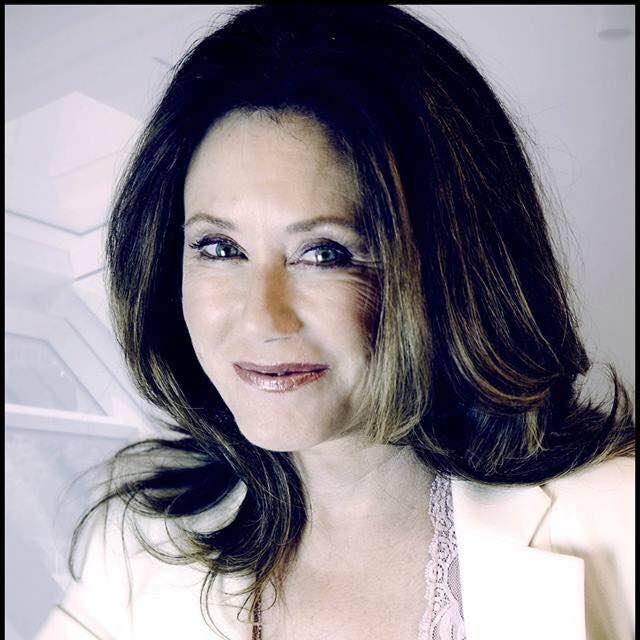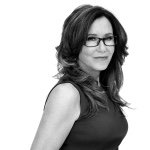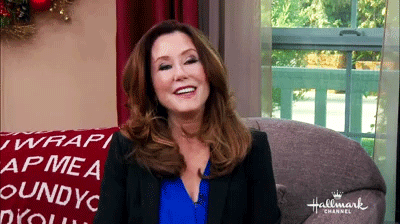
Interview: Mary McDonnell [Battlestar Galactica]
James Rundle
April 28, 2009
Battlestar is drawing to a close now of course, but have you been happy with the progression of your character?
I have, truly. And surprised quite often, you know what I mean? That’s part of why I’m so happy, that things would emerge from the writers that I hadn’t really considered. I remember in the very beginning, I understood suddenly that I was going to…that she was going to struggle with an illness the whole time, I just thought ‘Oh my goodness’. But that opened up for her in a way that she was able to articulate other aspects of her life, her personality. In retrospect, it was a really wonderful…privilege, to play that, and to try and understand a woman in power. The woman in power who didn’t have the ambition towards it. The thing is…most women in any position of power, certainly in politics, have been through a lot of things that have brought them there. They’re geared to that, there’s a level of ambition towards that. She did not have an ambition towards politics, she was a great teacher and the president plucked her out of that, convinced her to sit in his government. But that was as much as she needed. So that was what was really interesting, it wasn’t playing like…the first female leader, with all the ambition that comes with it, like Hillary [Clinton], Angela Merkel, or whoever. There’s a lot of women out there in power, the Senators, who had their eye on the prize. She was just handed this by destiny, this very big job. So that was kind of interesting, it was a different approach than what I would have taken, had I been playing the President Of The United States who had worked her way through the Senate, who had spent millions of dollars on her campaign, who had a huge house…it was a completely different idea.
So how did you approach the role, what informed your portrayal?
That’s a good question. What informed me in the pilot…what I felt was her sense, her very deep sense of responsibility as a teacher; she just transferred it to the fleet. I just started with that, and every time there was a big question for her, I kind of measured it within the context of what would be good for the people. So it was constantly coming back…there were things that she had to make decisions about that she had no preparation for, so the question remained constantly about how to keep the human race alive. It became very simple. Do you know what I mean?
She condensed it into a very specific line?
Yes, exactly.
We’ve interviewed several of your fellow cast members over the past year – Edward James Olmos, Michael Hogan, Jamie Bamber – and one thing that’s been clear through all of that is how invested in, and proud of, the show they are. Would you say that the same is true for yourself?
Oh, absolutely. It’s really been an honour, you know? You really do feel like you’ve gone through something relevant, and you’ve had great buddies on the front line. It’s said that making a good movie is a little bit like fighting a war, except that you don’t get hurt, but all of the other things around it do emerge. It’s been four years of making a good movie, that’s how it felt. It didn’t feel like we were making a TV show, it felt like every ten days we were doing a little film, and every film had its own components. The stakes were really high, because the stakes of the characters were always high. We never got complacent, and that was such a joy. The actors were so wonderful, everyone was so delightful, and I don’t think that happens very much in a lifetime.
Were you relieved to find out that Roslin wasn’t one of the Final Five? There was that one scene with Lucy Lawless’s character
Yeah, she scared me for a second! And I thought that was really fun in the writing. But that was the only moment that I, or Laura, ever suspected that she was. It would have been a complete shock, and I, Mary, just didn’t consider it.
It wouldn’t have been the best direction for the writing.
I just couldn’t imagine it! To what end, do you know what I mean? Then we’d have to…no, no. It never made any kind of sense to me at all, so I didn’t really think about it. I was too busy thinking about whether or not I’d live long enough for the next season every day.
Speaking of which, it must have been difficult to portray a character with such a degenerative disease as cancer. How much research did you conduct, did you visit cancer wards, or…?
Yeah, I know a lot of people who have passed from cancer. Unfortunately, we all know a lot of people with cancer. I talked to a couple of oncologists, and when we were first doing the pilot, I had a few really interesting meetings with a couple of cancer doctors and I found out a few things that helped me. And every time a few things came up in the script that I wasn’t sure about – for example, her being able to job lately – I was reassured that, yes, these things happen, that suddenly there are days where you are…you feel like a million bucks, and you don’t know why.
Jamie Bamber said to us that, for him, the show’s central theme is about questioning who we are as people, why we continue when all of the odds are stacked against us. What would you say the central theme of the show, or the main question it asks, is for you?
For me it was always a question of allowing this self to be part of the other. It was always about what I think we have to do as human beings right now, which is expand our perception of self. Almost eliminate it, so we recognise the self and the other, and the other stops being that. To me, it’s all about the concept of the other. Do you know what I’m saying? What I loved was that without having to think along those terms, the characters were constantly coming up against…the sort of illusion that there was another, and the trickery of it being that in certain cases, it was themselves. Even within the fleet, our family or friends became that other. So what are we doing making the other to begin with? For me it’s about the beginning of where I think we are as a globe, which is the beginning of a consciousness where we finally understand that we’re projecting the enemy out there. If we stop projecting the enemy, perhaps we stop creating the other. Perhaps we stop living this dualistic reality. That’s what I always thought it was about, I mean the first time that I read it, I went ‘Oh, that’s where this will live!’
Did you have any idea that the show would be as successful as it has been?
I did. I did, you know, people always say ‘Oh no, I had no idea…’, but I did. It’s so funny though, it was offered to me and I giggled because I was at lunch, and my agents came in and said ‘We just got an offer for you to do a miniseries in science fiction.’ So I said ‘Really? Sci-fi?’ I never saw myself in that role. I asked what it was, and they looked at each other and said ‘Well…it’s a remake of Battlestar Galactica.’ I said: ‘What…what are they going to do with me in that? I’m the prairie woman, I’m the Indian girl! What are you talking about?’ So we all had a good laugh and I said ‘Have you read it?’ They said that they hadn’t, but it was coming to the office after lunch. So I finished up and took it home, but I was snarking all the way you know? But I always read an offer, no matter what, because I think offers are really generous. They entrust you with a lot, and even if you can’t do it, they deserve your opinion, your response, your ideas and your respect. So I was kind of giggling, thinking that I didn’t know if this would be…then I read it. And, I saw it as a cultural event. Right away. So the next day I said: ‘I’d love to do it, what can we work out?’ It was instant.
Do you have any favourite episodes from the show, or any favourite moments that you as an actress have had?
You know, in general I just really love, I absolutely adore the episodes when we’re all there. I loved the trial, I loved the election; I loved the beginning – the pilot – when we were at the funeral. I love it whenever we’re all together. I was just as high as a kite, like when we landed on the Earth that turned out not to be Earth, that was a really dismal scene, but we were actually happy! We were like little kids running around at the beach and taking photos, and people getting to film scenes, and we were just about to go on the actors’ strike. So whenever anybody yelled ‘cut’, everyone was whipping out their cell phones and talking to their agents, and talking to the union, and trying to figure out what was happening.
Of course, the writers were on strike at the time. Can we ask, are you a member of the Screen Actors Guild?
Yes.
What’s your opinion on the current contract dispute?
Well I actually see both points of view within the union, and I think ultimately, some day, we’ve got to do something. I think right now, with the economy and people in such a panic coming up to such a hard time, this strike would be a very difficult thing to make positive. It’s very hard to strike from such a feeling of loss that people are obviously going through right now. But I do feel that the actors, the writers…I don’t know about the directors, I’m not really sure where they are with all of this…but I do feel that some day down the line we’ve got to put a stop to things because it’s…it’s just too much, our images being distributed without our control any more. I mean, we used to negotiate that very specifically, very specifically. Even if you did an event like this, you’d negotiate the pictures that you were signing, or the pictures that were being taken. Now, entire events are…cell phones are going off with photographs, there’s videotaping and it’s on YouTube the next day. Not [at the SF Ball] perhaps, but in general, you know what I mean? We’re going into a new age, and none of us are quite sure what it means, or what kind of business it’s going to become, so yeah, I think there are going to be a couple of moments along the way over the next ten years where people are just going to have to negotiate something more specific.
Something more equitable, perhaps.
Yeah, fair. Fairness would be nice, right?
Before television, you worked extensively in theatre of course. What was it that drew you to acting in the first place, what was it that made you decide to be an actress?
Well I discovered it in college really. I met some people, I met a woman in my dorm who turned out to be one of my dear friends, and she was already getting a [Bachelor’s Degree] in Theatre Arts. So I started going to the theatre with her, and she was already designing props, and assistant directing, but I started meeting theatre people, and I’d never met people like this. I was an athlete and a cheerleader, I didn’t have any sort of…I wasn’t involved in the arts at all, let’s put it that way. I played a bit of piano. I found that my brain seemed to come to life with artistic people, so I also took a class, because my father, God bless him, in one of my electives said ‘Why don’t you take this introduction to theatre class? You don’t know anything about that.’ I said okay, I’d take it. My first semester was in that class, and it was a fabulous professor who was famous for that class, and I found that when I was studying life through the lens of theatre, I was a lot smarter. So I went from there, and then I auditioned for a play and said ‘Oh, I really believed I saw that yellow bird,’ I like, literally, at my audition, finished and went ‘Oh my God, you’re good’ I said to myself! This whole thing happened out there, and I had no idea.
It just clicked for you?
Yeah it was natural. And I got the part, and I haven’t stopped. Isn’t that mad?
Do you have a preferred medium to work in – film, theatre, television?
You know, it’s really interesting. I would have said originally theatre, but then…no, I don’t prefer…I think that if you’ve got good writing, and good people, all three of them offer extraordinary experiences. I think at this point in my life, when I was raising my children, film and television were a lot more appropriate to me. It was very hard for me to leave the house at dinnertime each night. At the time that you want to be at home, you go to work, and at the time you have to be with your kids, they go to school. So that wasn’t working for me. A lot of people can do it, but I wasn’t good at it. So film and television became a lot more appropriate to that, but I do think that I’ll go back to the stage now the kids are gone, eventually.
Do you have any interest in maybe working behind the scenes, in a producing or directing capacity?
Producing maybe.
Yeah?
Yeah, people keep trying to get me to direct, but I don’t think that’s my…I don’t think I’m as visual as perhaps one needs to be.
Are you more practical?
I’m…I’m very intuitive. And I’m very kinaesthetic, so as an actor I can stand up, walk around, and I get it. But I’m not sure how that translates to the picture.
Perhaps moving the camera around wouldn’t help.
Yeah! You know, I don’t know if you know this but I went…I spent a year at university in Manchester?
Oh really?
Yeah. It was a long time ago, I was at the State University of New York at Fredonia, which is one of the SUNYs. Do you know what the SUNY system is?
Er, not specifically.
It’s the same thing as the UC system, the California State Universities. The New York State Universities are called the State Universities Of New York, SUNYs. They were creating a pilot exchange program with the University of Manchester, and Manchester Polytechnic for people in the Theatre Arts in the SUNYs. So I was an experiment.
So you spent a year over here?
A year! We were in a little company that was composed mostly of postgrad students from all over England, and Julie Walters was the actress. It was so much fun, I learned a great deal from her, it was really cool. So I have a real soft spot for England, and Manchester.
It’s good to get a bit of cross-pollination so to speak, broaden your horizons.
Oh it’s very important.
So what are the roles that tend to attract you to them? You’ve played a president, a first lady, a doctor with Aspergers Syndrome in Gray’s Anatomy, they’re all quite diverse.
It’s an interesting question, because I think what has attracted me to roles, the roles that people have see me in, they all seem to have a little bit of…sort of wrangling with independence and power in them. Every once in a while I play someone who is more, let’s say, content with their role in life. But I always seem to be exploring a state of independence in a world that isn’t necessarily supporting them.
Going back to Battlestar briefly, at the beginning of season three the show became more intensely allegorical and politicised than arguably it had before. Have there been points where that’s caused any problems for you, or rubbed heavily against your own politics?
Yeah! [laughs] Not really problems, but there were moments along the way where I had to really take a deep breath and find a way to open up to, and understand, Laura’s political point of view as a survival mechanism. And remove my experience from hers, because it’s so radically different really. You couldn’t just take contemporary politics [and apply them] – although people like to use the show that way – there are layers and layers in which they just don’t relate at all. She was the president, but not the commander in chief simultaneously; she just had to ride the power but couldn’t fly the plane. There was no cabinet – there was no cabinet, there was a Quorum but no government per se. So I had to constantly move all of those ideas away and deal with, once again, what action do I have to take to protect the human race? And some of those actions, at times, were really ones that I would find despicable, but I understood them from Laura’s point of view.
And how approachable were the showrunners, Ron Moore and David Eick, if you came to them with a problem, or wanted to do something with your character?
Oh, they’ve just been awful. I’m teasing! Please say that I’m joking!
We can see the headline now.
I know! Please don’t do it, I’ll get in so much trouble. The reason I can say that is because they were the opposite, they were fantastic. They put up with so much from me. One of the funniest things, that I really treasure, is one day I’m on my computer, and I’m having a bit of an argument with David Eick about a moment, right? We’re going back and forth, back and forth, back and forth and we’re getting a little testy with each other. It’s the kind of thing where’s you’re going ‘Should I press send, should I not press send?’ You know? So we just kept going back and forth, and all of a sudden…this e-mail comes in, and it says: ‘Mary, David, this is Ron. Mary, you will act Laura as it is written. David, you will enjoy watching Mary act Laura as it is written. And, as always, I am honoured to be working with both of you. Ron.’ [laughs] And that was the end of it, it was so hilarious. They were wonderful, and they listened, and they…they stretched at times for my thoughts, and there were other times when they were very clear with me. David was good, he was really good at saying to me: ‘No. This is what we need her to do, and this is how I see it.’ And he always had a very good, strong argument for why Laura’s action was necessary and good. So he was able to play both sides of the fence to buffet the argument in a way that I found very interesting. He’s got a great political mind, he can always see both sides. So, he helped me have the courage to play Laura in some of those more difficult moments, he helped me have confidence and commitment for some of her solo choices, because she went solo a lot.
Obviously, the show’s finishing now, since David Eick and Ron Moore have decided to conclude it with the fourth season. Do you agree that it’s come to a natural conclusion, or would you rather it carried on for longer?
I think they’re absolutely right to finish it, because the integrity that exists because they chose to do it this way is so extraordinary. And I think that it’s even better in retrospect, now that I know the ending, to revisit the beginning. It’s highly charged, and really, surprisingly, more profound. With the knowledge…seeing it as a piece of history as opposed to not knowing what’s going to happen, I think makes it more interesting. So I think that that were right, rather than to end up in a benign zone for a while or run out of story, it’s a very hard thing to maintain that level, and I think they did it.
